小学英语一般过去时专题讲解知识分享
- 格式:docx
- 大小:20.90 KB
- 文档页数:7

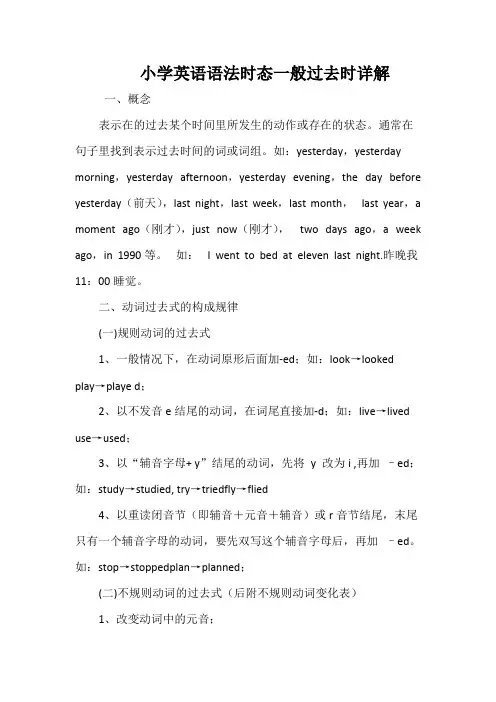
小学英语语法时态一般过去时详解一、概念表示在的过去某个时间里所发生的动作或存在的状态。
通常在句子里找到表示过去时间的词或词组。
如:yesterday,yesterday morning,yesterday afternoon,yesterday evening,the day before yesterday(前天),last night,last week,last month,last year,a moment ago(刚才),just now(刚才),two days ago,a week ago,in 1990等。
如:I went to bed at eleven last night.昨晚我11:00睡觉。
二、动词过去式的构成规律(一)规则动词的过去式1、一般情况下,在动词原形后面加-ed;如:look→looked play→playe d;2、以不发音e结尾的动词,在词尾直接加-d;如:live→lived use→used;3、以“辅音字母+ y”结尾的动词,先将y 改为i ,再加–ed;如:study→studied, try→triedfly→flied4、以重读闭音节(即辅音+元音+辅音)或r音节结尾,末尾只有一个辅音字母的动词,要先双写这个辅音字母后,再加–ed。
如:stop→stoppedplan→planned;(二)不规则动词的过去式(后附不规则动词变化表)1、改变动词中的元音;begin→began drink→drank come→came eat→ate grow→grew run→ran know→knew win→wonspeak→spoketake→took write→wrote get→got2、变词尾的–d 为–t ;build→built lend→lent send→sent spend→spent bend→bent3、与动词原形一样;cut→cut put→put cost→cost hurt→hurt shut→shut4、变-ay 为-aid (少数动词);say→said pay→paid lay→laid5、采用不同词根;sell→sold teach→taught buy→bought6、其他。
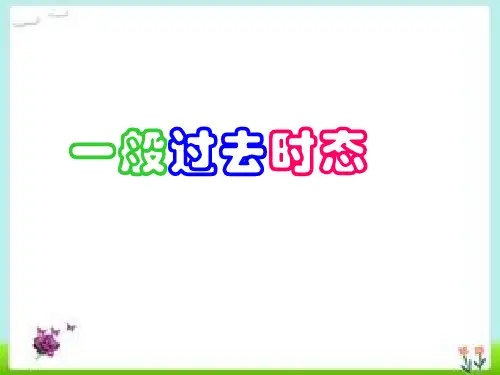
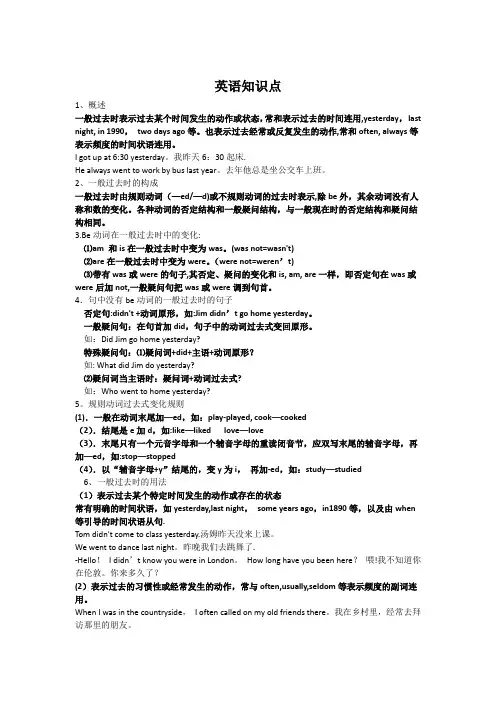
英语知识点1、概述一般过去时表示过去某个时间发生的动作或状态,常和表示过去的时间连用,yesterday,last night, in 1990,two days ago等。
也表示过去经常或反复发生的动作,常和often, always等表示频度的时间状语连用。
I got up at 6:30 yesterday。
我昨天6:30起床.He always went to work by bus last year。
去年他总是坐公交车上班。
2、一般过去时的构成一般过去时由规则动词(—ed/—d)或不规则动词的过去时表示,除be外,其余动词没有人称和数的变化。
各种动词的否定结构和一般疑问结构,与一般现在时的否定结构和疑问结构相同。
3.Be动词在一般过去时中的变化:⑴am 和is在一般过去时中变为was。
(was not=wasn't)⑵are在一般过去时中变为were。
(were not=weren’t)⑶带有was或were的句子,其否定、疑问的变化和is, am, are一样,即否定句在was或were后加not,一般疑问句把was或were调到句首。
4.句中没有be动词的一般过去时的句子否定句:didn't +动词原形,如:Jim didn’t go home yesterday。
一般疑问句:在句首加did,句子中的动词过去式变回原形。
如:Did Jim go home yesterday?特殊疑问句:⑴疑问词+did+主语+动词原形?如: What did Jim do yesterday?⑵疑问词当主语时:疑问词+动词过去式?如:Who went to home yesterday?5。
规则动词过去式变化规则(1).一般在动词末尾加—ed,如:play-played, cook—cooked(2).结尾是e加d,如:like—liked love—love(3).末尾只有一个元音字母和一个辅音字母的重读闭音节,应双写末尾的辅音字母,再加—ed,如:stop—stopped(4).以“辅音字母+y”结尾的,变y为i,再加-ed,如:study—studied6、一般过去时的用法(1)表示过去某个特定时间发生的动作或存在的状态常有明确的时间状语,如yesterday,last night,some years ago,in1890等,以及由when 等引导的时间状语从句.Tom didn't come to class yesterday.汤姆昨天没来上课。
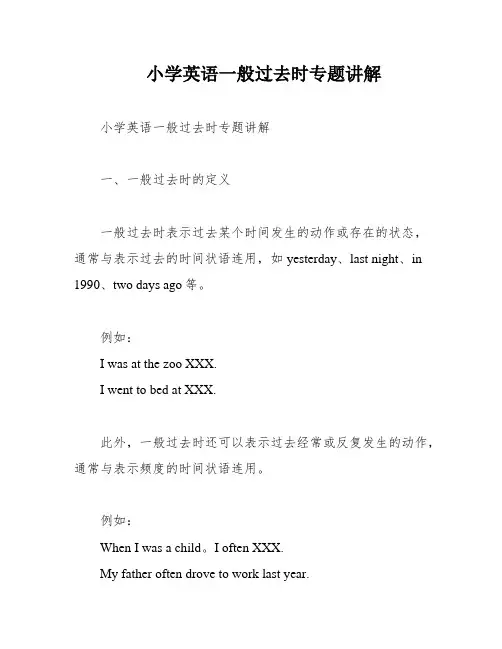
小学英语一般过去时专题讲解小学英语一般过去时专题讲解一、一般过去时的定义一般过去时表示过去某个时间发生的动作或存在的状态,通常与表示过去的时间状语连用,如yesterday、last night、in 1990、two days ago等。
例如:I was at the zoo XXX.I went to bed at XXX.此外,一般过去时还可以表示过去经常或反复发生的动作,通常与表示频度的时间状语连用。
例如:When I was a child。
I often XXX.My father often drove to work last year.二、一般过去时的构成1.在表示某个时间里存在的状态,构成为主语+be的过去式(was。
were)+其他。
be的过去式的用法是:was用于I、he、she、it,而复数形式we、you、they全部使用were。
例如:I was at home XXX.We were in the gym just now.2.在表示过去某个时间里发生的动作,构成为主语+动词的过去式+其他。
例如:XXX.XXX.动词过去式变化规则:1.一般在动词末尾加-ed,如wash — washed,play —played。
2.结尾是e加d,如dance — danced,love — loved,live — lived。
3.以“辅音字母+y”结尾的,变y为i,再加-ed,如carry — carried,study — studied。
4.末尾只有一个元音字母和一个辅音字母的重读闭音节,应双写末尾的辅音字母,再加-ed,ped。
5.不规则动词过去式:(注:除去不规则变化动词,其他动词都是规则变化)例如:XXX.She ran in the park this morning.They bought some food at the supermarket.过去式madewrotedrewflewrodespoke四、一般过去时态的“三变”技巧一变:肯定句变为否定句当句中含有情态动词或助动词could,would等时,可直接在其后面加not构成否定句。

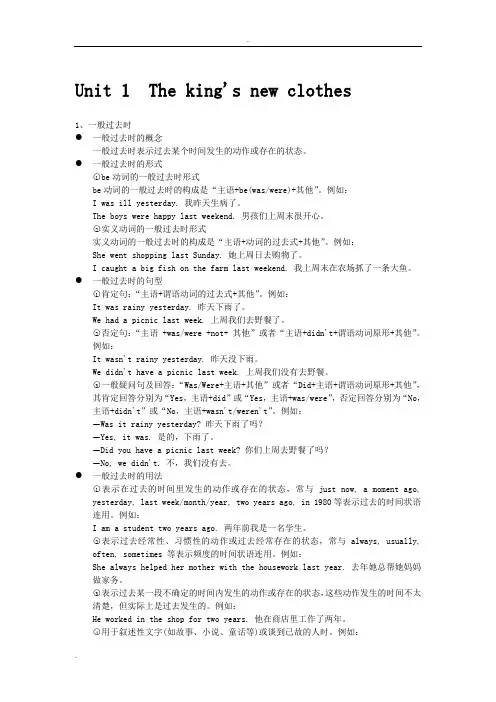
Unit 1 The king's new clothes1、一般过去时●一般过去时的概念一般过去时表示过去某个时间发生的动作或存在的状态。
●一般过去时的形式○1be动词的一般过去时形式be动词的一般过去时的构成是“主语+be(was/were)+其他”。
例如:I was ill yesterday. 我昨天生病了。
The boys were happy last weekend. 男孩们上周末很开心。
○2实义动词的一般过去时形式实义动词的一般过去时的构成是“主语+动词的过去式+其他”。
例如:She went shopping last Sunday. 她上周日去购物了。
I caught a big fish on the farm last weekend. 我上周末在农场抓了一条大鱼。
●一般过去时的句型○1肯定句:“主语+谓语动词的过去式+其他”。
例如:It was rainy yesterday. 昨天下雨了。
We had a picnic last week. 上周我们去野餐了。
○2否定句:“主语 +was/were +not+ 其他”或者“主语+didn't+谓语动词原形+其他”。
例如:It wasn't rainy yesterday. 昨天没下雨。
We didn't have a picnic last week. 上周我们没有去野餐。
○3一般疑问句及回答:“Was/Were+主语+其他”或者“Did+主语+谓语动词原形+其他”,其肯定回答分别为“Yes,主语+did”或“Yes,主语+was/were”,否定回答分别为“No,主语+didn't”或“No,主语+wasn't/weren't”。
例如:—Was it rainy yesterday? 昨天下雨了吗?—Yes, it was. 是的,下雨了。
—Did you have a picnic last week? 你们上周去野餐了吗?—No, we didn't. 不,我们没有去。
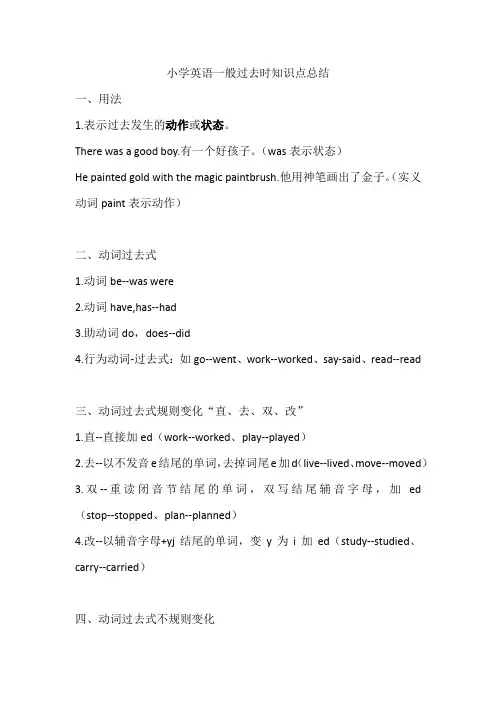
小学英语一般过去时知识点总结一、用法1.表示过去发生的动作或状态。
There was a good boy.有一个好孩子。
(was表示状态)He painted gold with the magic paintbrush.他用神笔画出了金子。
(实义动词paint表示动作)二、动词过去式1.动词be--was were2.动词have,has--had3.助动词do,does--did4.行为动词-过去式:如go--went、work--worked、say-said、read--read三、动词过去式规则变化“直、去、双、改”1.直--直接加ed(work--worked、play--played)2.去--以不发音e结尾的单词,去掉词尾e加d(live--lived、move--moved)3.双--重读闭音节结尾的单词,双写结尾辅音字母,加ed (stop--stopped、plan--planned)4.改--以辅音字母+yj结尾的单词,变y为i加ed(study--studied、carry--carried)四、动词过去式不规则变化1.中间有双e,去e尾加t(保持keep--kept)2.结尾d要变成t(建筑build--built)3.遇见i来,a来替(坐sit--sat)4.若是买来想打仗,战甲ought要换上(买buy--bought、带来bring--brought)5.教书抓住刷流氓,制服aught来帮忙(教teach--taught、catch--taught)6.ow/aw凑热闹,变成ew最时尚(知道know--knew、生长grow--grew)7.“放、读、切、让”过去原形都一样(放put--put、切cut--cut、让let--let、读read/ri:d/--read/red/)五、过去式+ed的发音“清清浊浊,元后浊,td后面读id”1.在以清辅音结尾的规则动词后,ed读作/t/(worked//)2.在以浊辅音或元音结尾的规则动词后,ed读作/d/3.在以/t/或/d/结尾的规则动词后,ed读作//六、与过去时连用的时间词1.ago家族(两分钟之前two minutes ago、五年之前five years ago、很久很久之前long long ago)st家族(上周last week、上个月last month、去年冬天last winter)3.yesterday家族(昨天早晨yesterday morning、前天the day before yesterday)4.that家族(那天早上that morning、那天that day、那年that year)5.其他(刚才just now、那些天in those days、在1980年in 1980、那是at that time、以前once upon a time)七、句式变化1、肯定句变否定句:+not表动作(无be,借助did,did+ not)表状态(be+not)2、肯定句变一般疑问句:一挪二改表动作(一挪:有be挪be,没be借did,先借再挪;二改:人称一变二,句号变问号)表状态(一挪:be挪到句首;二改:人称一变二,句号变问号)3、对划线部分提问:一找二挪三改表动作(一找:找到划线部分对应的疑问词,将疑问词放到句首;二挪:有be动词的挪be,没有be动词的借助did,先挪再借,挪到疑问词后,其他照抄;三改:人称一变二,句号变问号)表状态(一找:找到划线部分对应的疑问词,将疑问词放到句首;二挪:be挪到疑问词后,其他部分照抄;三改:人称一变二,句号变问号。
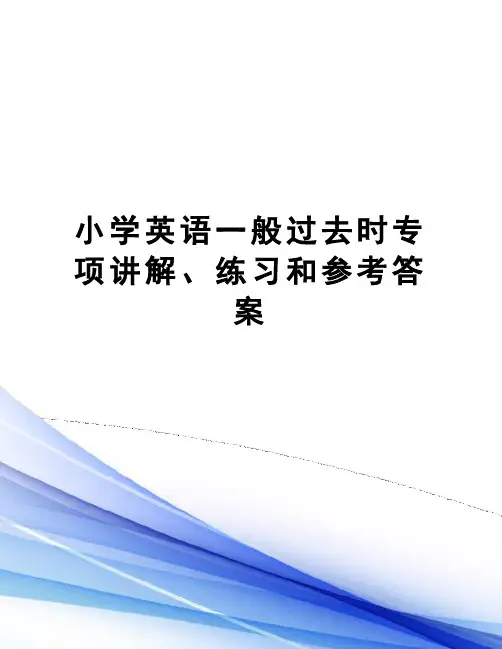
小学英语一般过去时专项讲解、练习和参考答案一般过去时专项讲解与练习一、概念:一般过去时表示过去某一时候发生的动作或存在的状态。
常与一般过去时连用的时间状语有:yesterday; 昨天just now刚才the day before yesterday;前天⋯⋯ago ⋯⋯之前(例如:三天前 three days ago )Last ⋯⋯上一个⋯(例如:上周星期天last Sunday )in 1990在1990年(in+过去时间)二、分类(一) be 动词的一般过去时:肯定句:主语 +be 动词的一般过去时( was/were)否定句:主语+be动词的一般过去时(was/were)+not一般疑问句: be 动词的一般过去时( was/were )+主语(二) there be结构的一般过去时与be 动词的一般过去时的变化基本一致。
(三)一般动词的过去时:肯定句:主语 +动词的过去时( I laughed.)否定句:主语 +did not+ 动词原形( I didn’t laugh.)一般疑问句: Did+主语 +动词原形( Did you laugh?)三.巧记 chant动词一般过去时,表示过去发生事;be 用 was 或用 were, have,has变had;谓语动词过去式,过去时间坐标志;一般动词加 -ed ,若是特殊得硬记。
否定句很简单,主语之后didn ’ t 添;疑问句也不难, did 放在主语前;如果谓语之前有 did ,谓语动词需还原;动词若是 was,were, 否定就把 not 添。
四、习题练习(一)用动词的适当形式填空:1.He ______ (work) in that bank four years ago.2.She ______ (live) in the US last Monday.3.I ______ (see) him yesterday.4.He _______(come) to school at 6 o’clock this morning.5.The boy _______ (have) a bad cold yesterday.6.When _______ you _______ (buy) that house?7.He _______(tell) a story to his daughter yesterday.8._____ you ____ (try) to call me last night?9.What _______you _______ (buy) in the shop?I ______ (buy) a coat just now.10. The doctor ______ (get) up late this morning.11.She ________ (paint) the wall last month.12.My mother _______ (be) a worker 20 years ago.13.________ (be) you here just now?No, I ________ (be not) here.14.Why _______ your brother _______ (cry) last night?15.It ______(be) my mother’s birthday yesterday.(二)翻译下列句子:1.我上周去看爷爷和奶奶了。
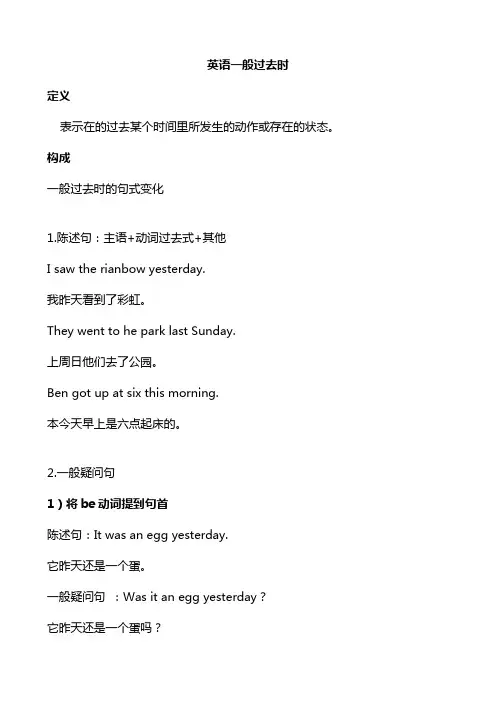
英语一般过去时定义表示在的过去某个时间里所发生的动作或存在的状态。
构成一般过去时的句式变化1.陈述句:主语+动词过去式+其他I saw the rianbow yesterday.我昨天看到了彩虹。
They went to he park last Sunday.上周日他们去了公园。
Ben got up at six this morning.本今天早上是六点起床的。
2.一般疑问句1)将be动词提到句首陈述句:It was an egg yesterday.它昨天还是一个蛋。
一般疑问句:Was it an egg yesterday?它昨天还是一个蛋吗?陈述句:They were at school just now.他们刚才还在学校。
一般疑问句:Were they at school just now?他们刚才还在学校吗?Linda老师的小提醒主语是第一人称和第二人称的句子,其过去时变化时,要注意be动词的变化。
一般疑问句:Were you at home last night?你昨天晚上在家吗?肯定回答:Yes,I was.否定回答:No,I wasn't.2)用助动词did陈述句:I did my homework at school,我在学校做了作业。
一般疑问句:Did you do your homework at school?你在学校做作业了吗?陈述句:They played basketball just now.他们刚才打了篮球。
一般疑问句:Did they play basketball just now?他们刚才打篮球了吗?小提醒由过去时态的陈述句变一般疑问句时,变化技巧上可以用拆分法,将动词过去式拆分为did+动词原形,然后将did提到句首,这样就不容易发生错误。
He slept a whole day.他睡了一整天。
第一步:先将slept拆分为did sleep第二步:将did提到句首变成:Did he sleep a whole day?他睡了一整天吗?3.否定句1)在be动词后面+not陈述句:I was a teacher twenty years ago.我20年前是一名老师。

一般过去时讲解一. 概念一般过去时表示过去某一时间发生的动作或存在的状态。
常和yesterday, last week(year), three days(weeks) ago,in 2003等时间状语连用。
二.一般过去时有下面三种用法:1.表示过去的动作或状态:I bought the hat yesterday.昨天我买了这顶帽子。
He was at school last Monday.上星期一他在上学。
2.表示过去的习惯动作:When he was at school, he wrote a dairy every day.他上学时,每天写一篇日记。
I used to get up early.我以前习惯早起。
注:"used to+动词原形"表示过去某一段时间内有规律的习惯。
3.表示过去发生的一连串的动作:The students got up early in the morning, did their morning exercise, fetched water, swept the floor and then studied English.学生们一早起来,做早操,打水,扫地,然后学英语。
三. 构成(1)主语+be动词(was,were)+其它。
当主语为第一、三人称单数时,be动词用was,主语为其它人称时,be 动词一律用were。
如:I(He, She) was in Grade 5 last year.They were students two years ago.(2) 主语+行为动词过去式(无人称和数的变化)。
如:We played football yesterday. Mr Li went to Shanghai last Sunday.3.变化形式:A.一般在动词词尾加ed。
例如:play—played clean—cleaned visit—visitedB.动词末尾字母是e的,在e后直接加d。
小学英语一般过去时专项讲解、练习和参考答案一般过去时专项讲解与练习一、概念:一般过去时表示过去某一时候发生的动作或存在的状态。
常与一般过去时连用的时间状语有:yesterday; 昨天 just now 刚刚the day before yesterday;前天……ago ……之前〔例如:三天前three days ago〕Last……上一个… 〔例如:上周星期天last Sunday〕 in 1990 在1990年〔in+过去时间〕二、分类〔一〕be动词的一般过去时:肯定句:主语+be动词的一般过去时〔was/were〕否认句:主语+be动词的一般过去时〔was/were〕+not 一般疑问句:be动词的一般过去时〔was/were〕+主语〔二〕there be 构造的一般过去时与be动词的一般过去时的变化根本一致。
〔三〕一般动词的过去时:肯定句:主语+动词的过去时〔I laughed.〕否认句:主语+did not+动词原形〔I didn’t laugh.〕一般疑问句:Did+主语+动词原形〔Did you laugh?〕三.巧记chant 动词一般过去时,表示过去发惹事;be用was或用were, have,has变had;谓语动词过去式,过去时间坐标志;一般动词加-ed,假设是特殊得硬记。
否认句很简单,主语之后didn’t添;疑问句也不难,did放在主语前;假如谓语之前有did,谓语动词需复原;动词假设是was,were,否认就把not添。
四、习题练习〔一〕用动词的适当形式填空:1. He ______(work) in that bank four years ago. 2.She ______ (live) in the US last Monday. 3.I ______ (see) him yesterday.4.He _______(e) to school at 6 o’clock this m orning.5. The boy _______(have) a bad cold yesterday. 6.When _______ you _______ (buy) that house? 7. He _______(tell) a story to his daughter yester day. 8. _____ you ____(try) to call me last night? 9.What _______you _______ (buy) in the shop? I ______ (buy) a coat just now. 10.The doctor ______ (get) up late this morning. 11. She ________ (paint) the wall last month. 12. My mother _______ (be) a worker 20 years ago.13. ________(be) you here just now? No, I ________(be not) here. 14.Why _______ your brother _______(cry) last night? 15. It______(be) my mother’s birthday yesterday. 〔二〕翻译以下句子:1.我上周去看爷爷和奶奶了。
一般过去时知识点大全小学一般过去时是英语中最常用的时态之一,用来表示过去发生或存在的动作、状态或习惯。
在小学阶段,学生需要掌握一般过去时的基本用法和规则,以便正确运用。
下面是一般过去时知识点的详细介绍:1. 一般过去时的构成:一般过去时是通过在动词原形后面直接加上“-ed”来构成的。
例如:play→played,paint→painted。
2. 一般过去时的肯定句:一般过去时的肯定句的结构是:主语 + 动词过去式 + 其他。
例如:I played soccer with my friends yesterday.我昨天和我的朋友们踢足球。
3. 一般过去时的否定句:一般过去时的否定句的结构是:主语 + did not + 动词原形 + 其他。
例如:We did not watch a movie last night.我们昨晚没看电影。
4. 一般过去时的疑问句:一般过去时的疑问句的结构是:Did + 主语 + 动词原形 + 其他?例如:Did you eat breakfast this morning?你今天早上吃早饭了吗?5. 一般过去时中的时间状语词:一般过去时通常与过去的时间状语词连用,表示动作或事件发生的具体时间。
例如:yesterday(昨天)、last week(上周)、two days ago(两天前)等。
6. 一般过去时中的特殊动词:一般过去时中有一些特殊的动词形式需要注意:- be动词的过去式形式是was(单数第一人称和单数第三人称)和were(其他人称和复数形式)。
- do动词的过去式形式是did。
7. 一般过去时中的规则动词和不规则动词:在一般过去时中,大部分动词都是按照规则进行变化的,即直接在动词原形后加上“-ed”。
而一些常见的动词则有自己的过去式形式,需要记住,其中包括go(went)、see(saw)、eat(ate)等。
8. 一般过去时与现在时态的对比:一般过去时表示的是过去发生的动作或状态,与现在时态形成对比。
五年级一般过去时知识点归纳总结五年级学生们,大家好!今天我将为大家总结一下五年级英语中的一般过去时知识点。
希望通过这篇文章,能够帮助同学们更好地掌握这一知识点。
一、什么是一般过去时?一般过去时表示在过去某个时间发生的动作或存在的状态。
在一般过去时中,谓语动词通常要变为过去式,表示过去的动作与状态。
二、一般过去时的构成1. 对于大多数动词而言,一般过去时的构成方法是在动词原形后加上-ed。
例如:- I walked to school yesterday.- She played basketball last weekend.2. 以不发音的'e'结尾的动词,只需加-d。
例如:- He lived in Beijing for five years.3. 以辅音字母+y结尾的动词,变y为i,再加-ed。
例如:- They studied English last night.4. 以重读闭音节结尾,并且末尾只有一个辅音字母的动词,需双写这个辅音字母,再加-ed。
例如:- I stopped and looked at the beautiful flowers.三、一般过去时的用法1. 表示过去某个时间发生的动作或存在的状态。
例如:- We visited the museum yesterday.- She was happy when she received the gift.2. 表示过去经常或反复发生的动作。
例如:- They often played soccer after school.3. 用于描述故事或叙述过去的事件。
例如:- Once upon a time, there lived a charming princess.四、一般过去时的注意事项1. 对于不规则动词,需记住其过去式的变化形式。
例如:- He caught a big fish in the river.2. 时间状语词在一般过去时中极为重要,可帮助读者更好地理解动作发生的时间。
小学一般过去时讲解
什么是一般过去时?
一般过去时是英语中用来描述已经发生或完成的动作、事件或状态的时态。
它表示过去某个时间发生的动作或情况。
如何构造一般过去时句子?
通常,一般过去时的句子结构由主语+动词过去式+其他成分组成。
动词的过去式形式取决于动词本身的变化规则。
以下是一般过去时句子的几个例子:
- 我昨天去了图书馆。
*(I went to the library yesterday.)*
- 他们在六点钟醒来了。
*(They woke up at six o'clock.)*
- 她在学校研究了很多科目。
*(She studied many subjects at school.)*
一般过去时的使用场景
用一般过去时来描述以下情况:
1. 过去的经历或经过的动作:例如,“我小时候住在农村。
”
2. 过去的惯或常态:例如,“他每天晚上都锻炼身体。
”
3. 过去的事实或真相:例如,“昨天下雨了。
”
4. 过去的时间表述:例如,“他在上周去了上海。
”
注意事项
- 一般过去时通常与过去的时间点连用,如“昨天”、“一个星期前”等。
- 条件从句的过去时间表现为“虚拟过去时”。
- 不要忘记动词的过去式形式变化规则。
希望这份讲解对小学生学习一般过去时有所帮助。
加油!。
小学英语一般过去时语法详解一、概念表示在的过去某个时间里所发生的动作或存在的状态。
通常在句子里找到表示过去时间的词或词组。
如:yesterday,yesterday morning,yesterday afternoon,yesterday evening,the day before yesterday(前天),last night,last week,last month,last year,a moment ago(刚才),just now(刚才),two days ago,a week ago,in 1990等。
如:I went to bed at eleven last night.昨晚我11:00睡觉。
二、动词过去式的构成规律(一)规则动词的过去式1、一般情况下,在动词原形后面加-ed;如:look→looked play→playe d;2、以不发音e结尾的动词,在词尾直接加-d;如:live→lived use→used;3、以“辅音字母+ y”结尾的动词,先将y 改为i ,再加–ed;如:study→studied, try→triedfly→flied4、以重读闭音节(即辅音+元音+辅音)或r音节结尾,末尾只有一个辅音字母的动词,要先双写这个辅音字母后,再加–ed。
如:stop→stoppedplan→planned;(二)不规则动词的过去式(后附不规则动词变化表)1、改变动词中的元音;begin→began drink→drank come→came eat→ate grow→grew run→ran know→knew win→wonspeak→spoketake→took write→wrote get→got2、变词尾的–d 为–t ;bu ild→built lend→lent send→sent spend→spent bend→bent3、与动词原形一样;cut→cut put→put cost→cost hurt→hurt shut→shut4、变-ay 为-aid (少数动词);say→said pay→paid lay→laid5、采用不同词根;sell→sold teach→taught buy→bought6、其他。
小学英语一般过去时专题讲解小学英语一般过去时专题讲解一、一般过去时的定义1. 表示过去某个时间发生的动作或存在的状态,常和表示过去的时间状语连用,如:yesterday, last night, in 1990, two days ago 等;I was at the zoo yesterday.I went to bed at eleven last night.2. 表示过去经常或反复发生的动作,常和表示频度的时间状语连用。
When I was a child, I often played football in the street.My father often drove to work last year.二、一般过去时的构成1. 在表示某个时间里存在的状态主语+be的过去式(was, were)+其它。
Be的过去式的用法: was用于我(I)、他(he)、她(she) 、它(it),复数(we, you, they)全部都用were.I was at home yesterday.We were in the gym just now.2. 在表示过去某个时间里发生的动作主语+动词的过去式+其它。
★三、动词过去式变化规则:1.一般在动词末尾加-ed,如:wash — _______ play — _______2.结尾是e加d,如:dance — danced love — _____ live —________3.以“辅音字母+y”结尾的,变y为i,再加-ed,如:carry — carried study — _______4.末尾只有一个元音字母和一个辅音字母的重读闭音节,应双写末尾的辅音字母,再加-ed,如:stop-_______5. 不规则动词过去式:(注:除去不规则变化动词,其他动词都是规则变化)四、一般过去时态的“三变”技巧一变:肯定句变为否定句【技巧1】当句中含有情态动词或助动词could,would,等时,可直接在其后面加not构成否定句。
例如:I could get you a book. → I could not / couldn't get you a book.【技巧2】当句中含有系动词was,were 时,可直接在其后加not构成否定句。
例如:I was at home when you called me. → I was not / wasn't at home when you called me.【技巧3】当句中谓语是除情态动词、助动词、系动词was, were以外的动词时,在该动词之前加did not / didn't,动词还原,构成否定句。
例如:The singer sang some Chinese songs. → The singer did not / didn't sing any Chinese songs.二变:陈述句变为一般疑问句【技巧1】移动词语的位置。
将was,were, could,would,should等移到句首。
例如:He could read it . → Could he read it ?【技巧2】添加助动词did。
谓语是除情态动词、助动词、系动词was, were以外的动词时,在主语之前加did,动词还原。
例如:Miss Zhang looked very old. → Did Miss Zhang look very old?三变:陈述句变为特殊疑问句【技巧1】确定疑问词:人who / whom,物what,地点where,时间when / what time,原因why,频率how often,长度how long,距离how far等等。
例如:They gave the mooncake last night. → Whe n did they give the mooncake?【技巧2】辨认结构形式:疑问词+情态动词/助动词/ was / were / did +主语+...? 例如: He played basketball at school yesterday. → Where did he played basketball yesterday? 一般过去时用法专练:一、写出下列单词的过去式。
1, look_________ 2,live________ 3,stop________ 4,carry________5, hope________ 6.call________ 7,finish_______ 8, are__________9,want________ 10,go________ 11,have_______ 12,do__________13.want_________ 14.get_______ e______ 16.say_________17.see________ 18.put________ 19. eat ___ 20.take ________ 21.read________ 22.is\am___ 23.watch___ 24.wash____25.clean___26. buy____ 27.visit ___ 28.win ____29.cook____ 30.let_____ 31.sit ___ 32.swim____33. learn___ 34.sing____ 35.stand____ 36.dance____37.cut____ 38.take____ 39.climb___ 40.die ____二、用动词的适当形式填空。
用be动词的适当形式填空1. I _______ at school just now.2. He ________ at the camp last week.3. We ________ students two years ago.4. They ________ on the farm a moment ago.5. Yang Ling ________ eleven years old last year.6. There ________ an apple on the plate yesterday.用行为动词的适当形式填空1. He _________ (live) in Wuxi two years ago.2. The cat ________ (eat) a bird last night.3. We _______ (have) a party last Halloween.4. Nancy ________ (pick) up oranges on the farm last week.5. I ________ (make) a model ship with Mike yesterday.6. They ________ (play) chess in the classroom last PE lesson.7. My mother _______ (cook) a nice food last Spring Festival.8. The girls ________ (sing) and _______ (dance) at the party.三、选择。
()1. —Did you help me clean my room ? —Yes, I .A. didB. doC. does( ) 2. —What did Lisa do yesterday? —She to music .A. listensB. listenC. listened( ) 3. What ____ he _____ yesterday?A. does, doB. do, didC. did, do( ) 4. They books last weekend.A. readB. readedC. look( ) 5. —What did you do last weekend? —I TV.A. sawB. looked atC. watched( ) 6. Did you swimming last weekend?A.goB. goesC. Went四、句型转换1. It was exciting.否定句:________________________________________________ 一般疑问句:____________________________________________ 肯、否定回答:__________________________________________ 2. All the students were very excited.否定句:________________________________________________ 一般疑问句:____________________________________________ 肯、否定回答:__________________________________________ 3.He watched TV last night.否定句:________________________________________________ 一般疑问句:____________________________________________ 肯、否定回答:__________________________________________课后作业一般现在时与一般过去时综合练习一、单选。
( ) 1. Jenny ____ in an office. Her parents ____in a hospital.A. work; worksB. works; workC. work; are workingD. is working; work ( ) 2. One of the boys_____ a black hat.A. haveB. there isC. there areD. has( ) 3. We didn’t go shopping beca use it____ yesterday.A. don’t rainB. didn’t rainC. rainsD. rained( ) 4. The sun ____in the east and ____in the west.A. rose; setB. rises; setsC. rises, setD. rise; sets( ) 5. Wang Mei ____ music and often ____ to music.A. like; listenB. likes; listensC. like; are listeningD. liking; listen ( ) 6. Jenny ____ English last night.A. has studyB. studiesC. studyD. studied二、填空。